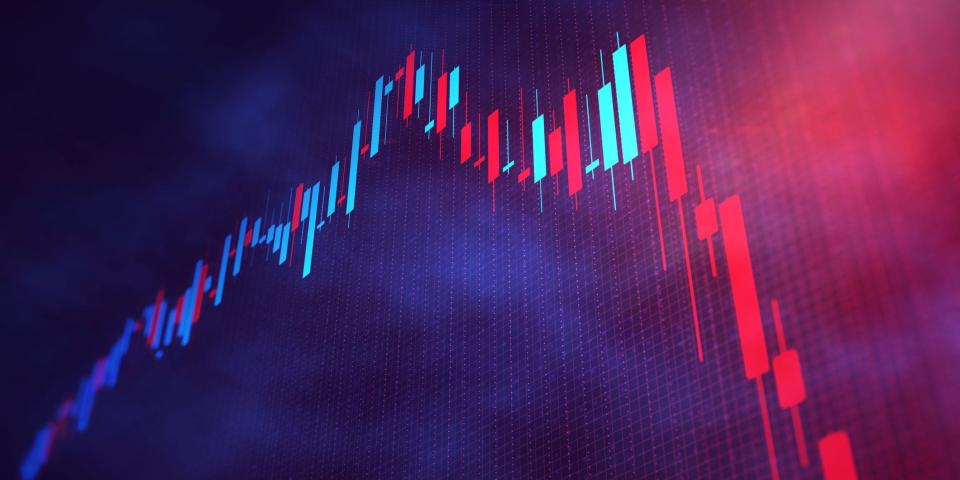

-
A recession will hit in 2024, according to Paul Dietrich, chief investment strategist of B. Riley.
-
Even a mild recession could spark as much as a 40% stock crash, Dietrich told Business Insider.
-
That’s because the market is looking the most overvalued since the dot-com craze of 2001, he said.
A recession will likely strike in 2024, and even a mild economic slowdown could send stocks plunging, as investors are playing in one of the most overvalued markets in over twenty years.
That’s according to Paul Dietrich, the chief investment strategist of B. Riley Wealth. US stocks have hit fresh records again this week following a wildly upbeat earnings report from chip maker Nvidia. But the higher stocks go, the higher they have to fall in a potential recession.
Dietrich is forecasting a mild recession to strike, but even a low-grade slowdown could spark as much as a 40% stock crash, which would take the S&P 500 to around 3,000.
“We’re still on the path to recession,” Dietrich told Business Insider in an interview, adding that even a strong GDP print for the quarter wouldn’t dent his confidence in a coming downturn. “We’re so overvalued now in the market.”
The optimism is high across Wall Street as investors price in hefty interest rate cuts this year and AI mania shows no sign of ebbing. Investors are expecting around 100 basis-points of rate cuts from the Fed, according to the CME FedWatch tool. Meanwhile, the economy has shown surprising resilience over the past year, with growth estimated to fall around 2.9% for the current quarter, per Atlanta Fed economists.
But a closer look at the numbers paints a less rosy picture of the economy. A slew of economic indicators have fallen into “deep recession territory,” Dietrich warned, pointing to signs of weakness flashing in the job market and consumer spending.
The unemployment rate remains near an all-time low, but workers without a job are having trouble regaining employment. Continuing unemployment claims have hovered close to 1.9 million since the start of 2024, a level Dietrich described as “recessionary” in a previous note.
Consumers also look like they’re having trouble keeping up with the pace of inflation and elevated borrowing costs. Credit card debt notched a record $1.13 trillion over the fourth quarter, Fed data shows, and it’s likely that consumers will soon run into their credit limits, Dietrich warned, pumping the brakes on what’s been an important engine of the economy in the last year.
Meanwhile, inflation likely isn’t getting back to the Fed’s 2% price target anytime soon, he predicted. While prices have cooled dramatically from their highs in 2022, the government printed a huge amount of money during the pandemic — around $2 trillion since Biden’s presidency — and the inflationary effects of that likely haven’t fully worked their way through the economy.
“Once the money is appropriated and spent, it takes about two years for the inflation to actually catch up. And that’s why I believe the last mile of inflation going down to 2% is going to be very, very difficult and very slow … It could, and probably will, cause stagflation we saw in the 70s,” Dietrich added, pointing to the stagflationary crisis of the decade, where prices soared while economic growth was slugged.
A recession, even a mild one, is never a smooth ride for stock investors, Dietrich warned. GDP didn’t even dip 1% at the trough of 2001 recession, though stocks plummeted 49% peak-to-trough. The overvalued Nasdaq Composite, meanwhile, plunged 78% peak-to-trough as investors got burned for their craze for internet stocks.
Though stocks fall an average 36% at the onset of a recession, Dietrich thinks the market today could fall even more, given that he sees stocks as the most overvalued they’ve been since 2001. Many tech stocks today — especially those that haven’t been able to back up their valuations with earnings — may crater as the economy enters a recession, he said.
“This current run-up in the stock market is based on the strength of 7 mega-cap tech stocks and the excited betting on when the Fed will lower rates. No one seems to notice that the economy is cooling and there are risks to the economy everywhere,” Dietrich said in a previous note.
New York Fed economists are pricing in a 61% chance the economy could tip into recession by January of next year. One under-the-radar economic indicator is pricing the odds of recession around 85%, the highest recession risk recorded since the Great Financial Crisis.
Read the original article on Business Insider
Source link






